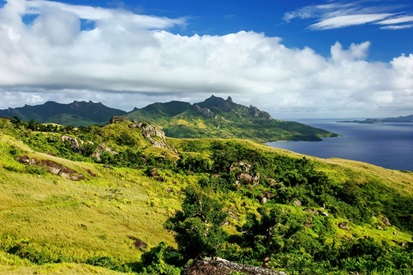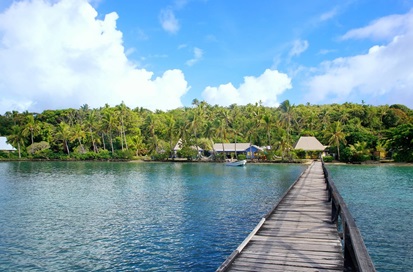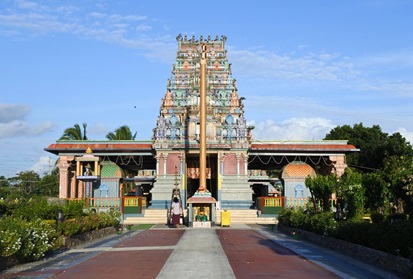

Suva is the capital of Fiji and the largest city in the South Pacific with a population of almost 80,000 people. This former colonial capital is located on the coast southeast of Viti Levu , the largest island in the archipelago.
Many tourists visit Fiji but never go to Suva due to its location: the city is approximately 4 hours by taxi from Nadi International Airport . But there are some really interesting places in Suva !

Depositphotos
Sights of Suva
Thurston Gardens
Thurston The Gardens is just 15 minutes' walk from the city centre. This is the Suva Botanical Garden . It was renamed in memory of Sir John Bates Thurston , fifth Governor of Fiji. You can discover local flowers, majestic palm trees and cool off in the shade. Here you can find many hiking trails, beautiful flowers and plants. You will also find Thurston Express, a locomotive that was used to transport cane sugar but is now a showpiece.
The gardens are free to visit and open all year round.

Depositphotos
Fiji Museum
It is home to many fascinating archaeological sites and many artefacts of indigenous culture. The museum is located in a beautiful garden and costs only $5 to enter. You will find here ancient exhibits of weapons, tools and ceramics, an exhibition about plants and animals living in Fiji, and a room dedicated to weaving. And even large, impressive life-size replicas of boats and rafts.
The museum amazes with its unique charm, cultural and artistic richness. The magnificent exhibition hall was built in 1955 and contains a wealth of evidence of Fiji's history. There are objects preserved there that are over 3,700 years old!
Mount Tomanivi
Mount Tomanivi was once known as Mount Victoria. Fiji used to be a British colony, so the mountain was named after the English queen. It is the highest point in Fiji, approximately 60 kilometers north of the city. It is part of a mountain range that crosses the island from north to south and is ideal for walking or exploring the rugged beauty of the island.
Take the main trail to the top of the mountain to see breathtaking scenery! The water in many rivers is suitable for drinking, and water sources originate in the deep valleys of the mountains.
Kolo-i-Suva Forest Park
This national park, located north of the city, has beautiful hiking trails leading to waterfalls. Here you can swim and make unforgettable selfie ! This is a popular place for birdwatchers: rare birds live in this untouched area.
Nukulau (island)
Go on an adventure to the island of Nukulau . You can get in for just $15 each way. Bring a couple of dollars with you for the island caretaker. There are many spots on the beach where you can have a picnic or spend the night, and it is a popular spot for backpackers to pitch tents in this unspoiled area. A good option to deviate from the usual tourist routes.
Government House
The magnificent Government House Castle, built in 1928, showcases all the art of the Fijians. The residence of the President of Fiji is located here. The view of the city and its surroundings is breathtaking. By the way, there is a guard near the main gate who marches every 15 minutes. The Presidential House is located right next to the museum in the heart of Suva .
Visit the Kolo-i-Suva Nature Reserve
Near Suva in Fiji is the Kolo-i-Suva Nature Reserve . It is a land of luscious flora and fauna, as well as amazing waterfalls and natural swimming pools. This is an attraction that is not very popular among tourists because it is located in the middle of nowhere. And it gives the feeling of an authentic tropical forest.
To visit here, you'll either need to rent a car and drive yourself, or join an organized tour.
Suva Market
There is a fresh produce market right in the center of Suva . In Fiji, you can buy tropical fruits such as mangoes and pineapples at very low prices. Be sure to try cassava or taro , which are commonly eaten by locals (the root vegetables are similar to potatoes, but take longer to cook). If you go to the market after 18:00, everything will be half price. But be aware that selection may be limited at this time of day.
Suva Municipal Market is huge: it's two stories high! In addition to fruits and vegetables, you will find spices and seafood in the markets. The main food market in Suva is on Harris Road and is open from Monday to Saturday.

Depositphotos
Shopping
If you want to buy souvenirs, then Suva is the best place to do it! Suva A less touristy part of Fiji than the islands, therefore the prices for souvenirs are lower. For example, you should buy a Bula shirt ! But in addition to souvenirs, you will find many clothing stores and grocery stores. The central streets of Suva are great for shopping and walking. Although Fiji is generally quite safe, you shouldn't carry valuables in your back pockets.

Depositphotos
Gastronomy of Fiji
Try a traditional Fijian dish: Ika Lolo . It is made from fish served in coconut cream with vegetables and cassava on the side. Also the most common are kokoda ( Fijian ceviche ), fish cured in lime juice and served with coconut milk! These dishes are delicious and you will find them in almost any restaurant in Suva ! If you don't like seafood, try Indian food!

Depositphotos
Visit Albert Park
Alberta Park is a large and beautiful park in Suva . It has great historical significance for Fiji. In 1928, Sir Charles Kingsford Smith landed here on the first trans-Pacific flight from the United States to Australia.
Albert Park has also been used as a meeting place for various dignitaries, including the Queen in 1954 and Pope John Paul II in 1986. It was also where Fiji's new flag was raised in 1970 and many important rugby games were played. Today, Albert Park often hosts festivals, sporting events and other events. Albert Park is free to visit and is located next to the government building.
Forestry Farm Tour
Waimakare Forest Farm is located in Wailoku , just 15 minutes' drive from Suva . It is a natural farm using a traditional agroforestry system .
Learn all about the local flora and fauna, medicinal plants, visit an eco-farm to try freshly squeezed fruit juice.
You can book a tour to Waimakare from Suva for just $65. Tours typically last half a day and include transportation to the farm, a tour, and snacks!
Boat trip on the Reva River
This is one of the most popular day tours in Suva . A full day trip from Suva down the Rewa River is a real adventure! You'll see the beautiful Fiji jungle and even sail past many small local villages. Taste kava , learn about the traditional way of life of the locals, and enjoy a buffet lunch in one of the villages along the route! And spend the day in the wild along the magnificent Rewa River.

Depositphotos
Car rental in Suva
Car rental is widespread. Each company has its own pricing policy, and you can easily find discounts and special offers. All major companies have offices at Nadi International Airport . From Nadi Airport to Suva is about 200 km, so the unlimited kilometer rate is most beneficial if you plan to travel to Suva .
- Prices across all agencies range from $65 and up per day for an unlimited mileage plan. Damage to the underbody and roof is not covered by insurance, so drive slowly over Fiji's countless road bumps and don't park under coconut trees!
- All renters must be at least 21 years old, and some companies require that they be at least 25 years old or have at least 2 years of driving experience.
- In Fiji, you drive on the left. Seat belts are required. The speed limit is 80 km/h on open roads and 50 km/h in cities and other populated areas. You cannot drive a car while talking on a mobile phone.
- Driving under the influence of alcohol or drugs is a criminal offense in Fiji. Police often block roads and test all drivers with breathalyzers .
- Most roads in Fiji are narrow, poorly maintained and crooked. Not all local drivers are well trained, experienced or qualified, and some (including bus drivers) drive too fast for the conditions. Keep an eye out for potholes, landslides, sharp turns and various stray animals - cows and horses pose a real danger, especially at night.
Also be aware of speed bumps: most Fijian villages have them. They are large enough to cause serious damage to the underside of the car, and no local insurance will cover it.

Depositphotos
Ferries
Ferries also operate between the main islands, carrying cars and passengers. However, their schedule can change dramatically depending on the weather and the condition of the ships. For example, ferries also operate between Suva, Savusavu and Taveuni .

Depositphotos
How to get to Suva
Naturally, to get to Suva , you must first fly to the airport: and Fiji Airways and Virgin Australia operates direct daily flights from Australia to Fiji's main airport, Nadi International Airport. Fiji has a second international airport, Nausori Airport , located in the capital Suva . The journey to Suva will take about 3.5 hours.
Taxi fare one way from Nadi to Suva is $135. Nadi Airport taxis are required to have both meters and air conditioning, but drivers do not always turn them on.
Public buses in Fiji are plentiful and inexpensive. The most convenient bus between Nadi Airport and Suva is the Fiji Bus Express with air conditioning. Shared taxis from Nadi to Suva cost about $17.
The easiest way to get to the hotel from the airport is to use a pre- arranged transfer . You can choose from low-cost bus transfers and meet your travel companions along the way, or for a small additional fee, choose a private transfer just for you.

Depositphotos
What to take with you to Fiji
Because Fiji has an equatorial climate, it often experiences heavy rainfall. Therefore, it is recommended to take a high-quality poncho with you to cope with the short and intense rainy season. And don't forget about mosquitoes: take sprays and other repellents.
More articles
- Indonesia's National Parks: 15 Amazing Reserves
- 17 Temples in Bali You Must See
- Hot Springs in Bali: Which and Where to Visit
- Indonesia's Natural Attractions: 18 Places Worth Seeing
- Meru Betiri National Park in Indonesia
- The Most Interesting Routes in Bali: 12 of the Best
- Mauritius in Winter: Weather and Top Attractions
- Samosir Island in Sumatra: All About Vacationing
- The Maluku Islands in Indonesia: All About Vacations
- 10 Unique Facts About Indonesia



